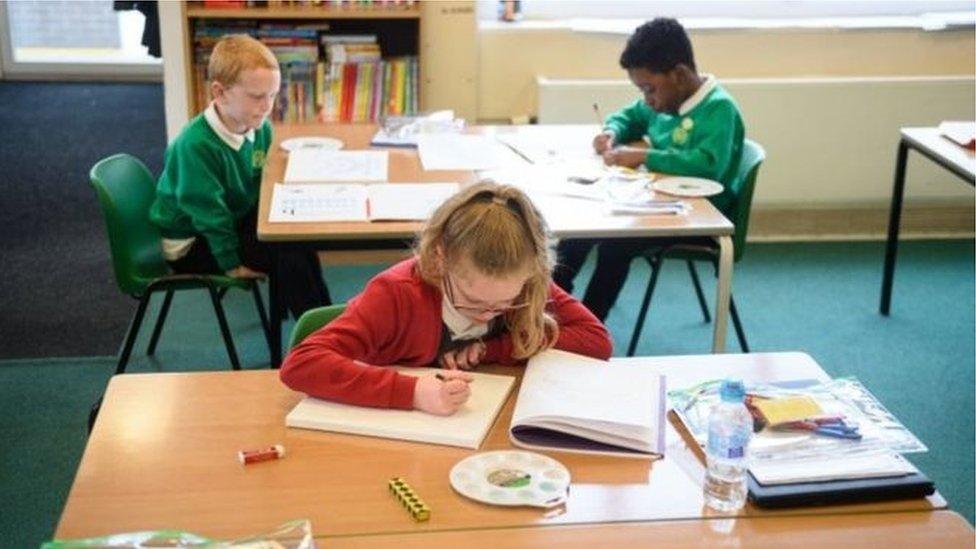Back to school: It's time to challenge some age-old practices
- Published

With schools soon to return, and with exam results imminent, it's time to think again about the school year, and to challenge some age-old habits and practices.
Young people should be enjoying spring, sitting exams in late autumn, and starting a new year in… the new year.
It's a bank holiday, and it's what journalists call the silly season. Working from home since March, it doesn't feel much like a holiday, and nor is there much silly to the current run of news stories.
But in the spirit of the season, I have something to suggest. You might think it silly, but it's an idea raised with serious intent.
And it should be of particular relevance to anyone planning to be back at school in a week: and anyone expecting their Scottish Qualification Authority (SQA) Higher and Nationals results on Tuesday morning - or anyone who has ever done so.
I was doing so nearly 40 years ago. In those days, we used to sit actual exams. Maybe next year, students will do so again.
A feature of the academic year was then, and remains now, that revision for exams was stepped up at precisely the moment when young and not-so-young alike want to be outside, enjoying the light evenings and the spring weather.
In April and May, there is a football season to see ended, and summer sports to take up. Outdoor education and exploration beckons.
The summer ordeal
I recall eight of my best years, when spring was spent either studying or not studying when I should have been doing so. There was a lot of the latter.
Why spring? The timetable probably dates back to an ancient church calendar. Older universities name their terms after holy feast days.
A year or so after I last sat an exam, I became education correspondent for The Scotsman, I recall reporting on a study carried out by one of the then education committee conveners, and a power in the land through the Convention of Scottish Local Authorities.

The current exams calendar means studying most during the Spring
It was possibly the late Elizabeth Maginnis of Lothian Regional Council, though I can't be sure. And going back to around 1991, it isn't within reach of a web search engine.
The report led up to recommendations of a complete revamp of the school year. Instead of a long summer holiday, the idea was that there should be four holidays of roughly equal length, and four terms, also of roughly equal length.
The main reason was that parents find the long summer holiday an ordeal if they're trying to balance it with work.
It didn't add - but I will - that the autumn term can also be an ordeal for pupils and teachers, if there isn't much of a break between mid-August and Christmas.
Flawed argument
But there was a flaw in the parental stress argument. The childcare problem persists if holidays are rearranged: it just seems less of an ordeal if the summer holiday is shorter.
There were at least three other flaws in the argument, as it turned out.
People wanted to book their summer holidays when the packages and flights were available, went one response.
And teachers need a long break if they're to be expected to mark all those exam scripts, process them through the qualifications authority, and get the leaving certificates printed out in time for university clearing.
The third problem was related to the first two: hardly anyone was on board for it.
Spidery handwriting
Nearly 30 years later, times have changed. The travel industry is much more flexible about departure dates. It might appreciate a wider spread of business through the year, rather than the summer pressure it has to contend with. Parents would appreciate holidays at cheaper times for travel.
Moreover, two or three holidays a year, and not necessarily in the summer sun, has become the norm for many people with money to spare, after taking care of the essentials. To listen to some of those unable to get to and from Spain due to the current quarantine restriction, it seems a miracle our forebears survived without at least one week a year in the Mediterranean sun.
Also, exams have changed. They're less about spidery handwriting on exam script booklets, and the pressure to cram in marking between early May and results day in August ought to be less intense.
And there's another change - an unexpected one. The entire school and academic year has been disrupted as never before. Schools, colleges and universities have missed months of conventional education, as well as a year's diet of exams.
We can assume that many pupils have lost ground and momentum rather than just stalling.
There has never been a greater need, nor opportunity, for a re-set of the system and of the school year.
What every teenager needs
So here's my suggestion, for your consideration on this August bank holiday: let's start the new school year next January, and have future exams in late November/early December.
What better way to spend the dark, dank days of early winter than with one's head in books and revision notes, thus freeing up spring for enjoying that long light and a boost of warmth?
And if neither colleges nor universities fall into line? That's a problem, but eight months of post-school break from studying could be just what teenagers need.
It's up to them, and to the rest of us, to make good use of that time in a national programme of voluntary work with outdoor education.